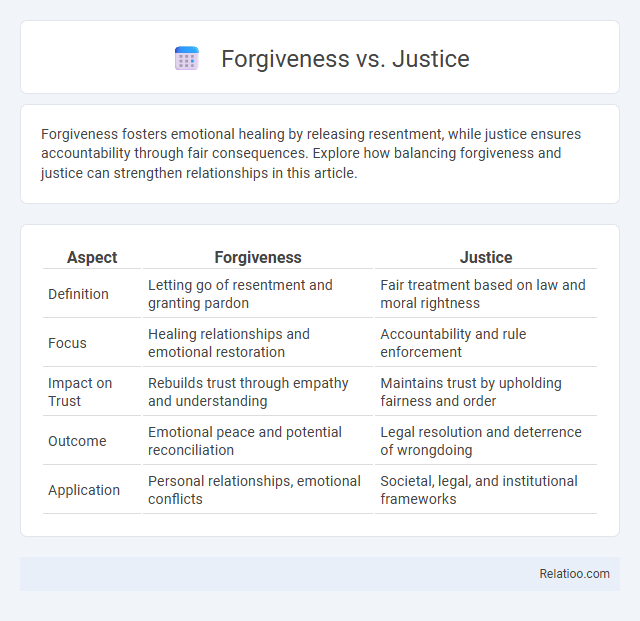Forgiveness fosters emotional healing by releasing resentment, while justice ensures accountability through fair consequences. Explore how balancing forgiveness and justice can strengthen relationships in this article.
Table of Comparison
| Aspect | Forgiveness | Justice |
|---|---|---|
| Definition | Letting go of resentment and granting pardon | Fair treatment based on law and moral rightness |
| Focus | Healing relationships and emotional restoration | Accountability and rule enforcement |
| Impact on Trust | Rebuilds trust through empathy and understanding | Maintains trust by upholding fairness and order |
| Outcome | Emotional peace and potential reconciliation | Legal resolution and deterrence of wrongdoing |
| Application | Personal relationships, emotional conflicts | Societal, legal, and institutional frameworks |
Understanding the Concepts: Forgiveness and Justice
Forgiveness involves letting go of resentment and granting emotional release to someone who has caused harm, promoting personal healing and reconciliation. Justice focuses on accountability and fairness, ensuring that wrongdoers face appropriate consequences to uphold societal order and protect victims' rights. Understanding the distinction between forgiveness and justice highlights their complementary roles: forgiveness nurtures inner peace, while justice maintains external balance.
Historical Perspectives on Forgiveness and Justice
Historical perspectives on forgiveness and justice reveal diverse cultural approaches to resolving conflict and restoring social harmony. Ancient societies often intertwined forgiveness with justice, as seen in restorative justice practices of Indigenous peoples and early legal codes like Hammurabi's, emphasizing reconciliation alongside reparation. Over time, Western legal traditions shifted toward retributive justice, focusing more on punishment than forgiveness, while many spiritual and philosophical systems continued to advocate forgiveness as a path to personal and communal healing.
The Psychological Impact of Forgiveness
The psychological impact of forgiveness significantly reduces stress, anxiety, and depression by promoting emotional healing and resilience. Studies show that forgiveness activates brain regions associated with empathy and compassion, fostering improved mental health and interpersonal relationships. Emphasizing forgiveness over strict justice can lead to greater psychological well-being and long-term emotional recovery.
Justice as a Foundation for Social Order
Justice serves as the essential foundation for social order by ensuring fair treatment, upholding laws, and protecting individual rights, which fosters stability and trust within communities. While forgiveness can promote personal healing and reconciliation, it must be balanced with justice to prevent impunity and maintain accountability. A society grounded in justice creates a structured environment where forgiveness can be meaningfully extended without compromising fairness or social norms.
Forgiveness in Religious and Spiritual Traditions
Forgiveness in religious and spiritual traditions often serves as a pathway to healing and reconciliation, transcending the demands of strict justice by emphasizing mercy and compassion. Many faiths, including Christianity, Buddhism, and Islam, teach forgiveness as a divine or moral imperative that liberates individuals from bitterness and promotes inner peace. This spiritual practice fosters personal transformation and community harmony, aligning with broader ethical values rather than merely enforcing retributive justice.
When Forgiveness Meets Justice: Conflict or Balance?
When forgiveness meets justice, the interaction often involves a complex balance between emotional healing and societal accountability. Your pursuit of justice emphasizes fairness and consequences, while forgiveness centers on releasing resentment and fostering reconciliation. Understanding how these concepts coexist can lead to conflict but also create opportunities for restorative justice that promotes both responsibility and compassion.
The Role of Empathy in Forgiving and Seeking Justice
Empathy plays a critical role in both forgiveness and justice by fostering understanding of others' perspectives and emotions. In forgiveness, empathy allows individuals to acknowledge the offender's humanity, facilitating emotional healing and reconciliation. In justice, empathy ensures that responses are fair and compassionate, balancing accountability with awareness of circumstances behind the actions.
Restorative Justice: Bridging the Gap
Restorative justice emphasizes healing and reconciliation by encouraging offenders to take accountability and victims to find closure, bridging the gap between forgiveness and justice. Your role in this process is crucial, as it fosters mutual understanding and promotes community healing over punishment alone. The approach prioritizes repairing harm and restoring relationships, creating a balanced pathway where forgiveness and justice coexist for lasting resolution.
Societal Benefits of Promoting Forgiveness and Justice
Promoting forgiveness and justice within society fosters healing and reconciliation, reducing conflict and enhancing social cohesion. Your community benefits from decreased recidivism rates and increased trust in legal systems, creating a safer and more equitable environment. Emphasizing both forgiveness and justice supports restorative practices that address harm while encouraging accountability and compassion.
Practical Steps for Navigating Forgiveness and Justice
Navigating forgiveness and justice requires clear boundaries between emotional healing and accountability measures. Practical steps involve acknowledging the harm, expressing feelings without condoning wrongdoing, and seeking restorative justice processes that prioritize reconciliation. Engaging in open communication, setting consequences, and fostering empathy supports balanced resolution while maintaining personal and social integrity.

Infographic: Forgiveness vs Justice
 relatioo.com
relatioo.com